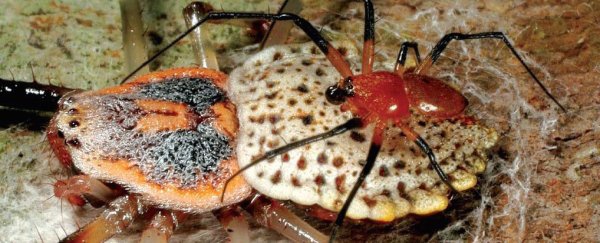We humans sometimes liken our bedroom antics to animals (you know, doin' it like they do on the Discovery Channel). But I think it's a safe bet nobody has ever - EVER - aspired to do it like a coin spider.
The male Southeast Asian coin spider, Herennia multipuncta, is up against several hurdles when it comes to reproduction.
Firstly, he's tiny compared to the female. She's roughly four times his size and would prefer to devour him whole than bear his eight-legged children.
If he's lucky enough to secure a mate, he then has to do everything he can to keep pesky rivals away from his impregnated female, lest they also manage to sneak their genes into the mix. That means guarding her aggressively.
And how might he do that, you ask?
Well, one method for the coin spider, it seems, is to voluntarily chew off one or both of its reproductive organs (these are known as palps, and in sexually mature males, are used to deliver sperm). The male spiders don't die after this brutal act, but live the rest of their lives as full or partial eunuchs.
It's a gruesome-sounding form of post-sex self-mutilation, but according to a new study in Behavioural Ecology and Sociobiology, it could be a difference-maker for these spiders when it comes to ensuring the survival of their genes.
Coin spiders only have enough sperm for one sexual exploit in their lives, so ditching their palps - which can account for 10 percent of their body weight - might help them become leaner, fitter, and better suited to fending off the competition.
And as Jan Piotrowski of New Scientist explains, this is important for spiders "as several males can fertilise the same batch of eggs."
Ecologist Matjaž Kuntner and his colleagues at the Slovenian Academy of Sciences and Arts in Europe were interested in whether this bizarre behaviour offered the male spiders any sort of evolutionary advantage.
Biting off the genitals has "long been considered a peculiar evolutionary phenomenon with unknown function" the authors wrote. And it is "taxonomically restricted" to roughly two dozen species of spiders, as well as certain insects.
Using coin spiders collected from Southeast Asia, the researchers set up 60 mating trials between virgin spiders (the females were well-fed virgins, presumably to avoid any chance they might prey on their tiny male counterparts)
Of the 32 mating trials that ended successfully (in sex), nine males became partial eunuchs in the aftermath, while 23 removed both of their reproductive organs.
As Sarah Zielinski from Science News reports: "Mating itself didn't result in emasculation; that left the palps merely disfigured. But within 24 hours of hooking up, the male always finished the job and chewed off what was left."
Yes, it's freaking nasty. So what exactly is the advantage?
When the self-emasculated spiders were compared with virgin males afterward, they were observed by researchers to be more aggressive in attacking their potential competitors, and they were able to stay closer to the females they had mated with.
The eunuch spiders also had more endurance, which might have resulted from their reduced body weight.
Sources: New Scientist, Science News
